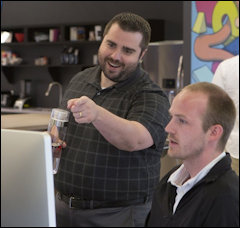
Hunter Willis, left, doubled his income by switching jobs from a call center to AvePoint in Richmond. Photo credit: Wall Street Journal.
A fascinating trend in the national job markets appears to be benefiting Virginia. A front-page Wall Street Journal article today is date-lined Richmond, Va.:
Pressed for workers, a New Jersey-based software company went hunting for a U.S. city with a surplus of talented employees stuck in dead-end jobs.
Brian Brown, chief operating officer at AvePoint, Inc., struck gold in Richmond. Despite the city’s low unemployment rate, the company had no trouble filling 70 jobs there, some at 20% below what it paid in New Jersey. New hires, meanwhile, got more interesting work and healthy raises.
As the unemployment rate approaches full employment, around 4%, companies are tapping the reservoir of under-employed — people working part-time, stringing together gig-economy work, or simply not fully utilizing the skills and capabilities they were trained for. It turns out there are a lot of those people in Virginia.
Here’s another example, which didn’t make it into the WSJ article: The Roanoke office of California-based PowerSchool will add 96 jobs and relocate to the former Norfolk Southern office building downtown.
PowerSchool’s expansion, announced Friday, will help offset the loss of more than 400 office jobs the railroad had eliminated in 2015, reports the Roanoke Times. The company expects the new jobs to pay an average annual salary of $68,116, 50% higher than today’s prevailing average wage in the city. The positions will include software development, customer service and administration and will filled during the next three years.
Roanoke is shifting from being a “train city to a brain city,” said Roanoke Mayor Sherman Lea.
After years of sub-par economic growth since the 2008 recession, prosperity is finally trickling down from the millionaires and billionaires who benefited from booming stock and bond markets to everyday Americans. As the labor market tightens, corporations are still slow to raise general wages, but by tapping hidden corners of the economy they are creating better job opportunities for thousands.
The WSJ estimates the number of part-time workers who would prefer to work full time is about 5.3 million, or about 3.2% of the civilian workforce. That’s down from 6% at the depth of the recession but still high by historical standards.
AvePoint faced stiff competition for qualified workers in Jersey City, across the Hudson River from New York City, recounts the WSJ. Rather than increase worker pay in New Jersey, the company hired a site-selection consultant to review some 20 other locales. Richmond fit the bill. Although unemployment was only 4%, under-employment was pegged at 12%.
AvePoint pays its Richmond workers about 20% less than its New Jersey employees, but CEO Brian Brown says its Richmond workers enjoy more buying power. Median housing prices in the city are 40% cheaper. Indeed, AvePoint’s experience in Richmond has been so positive that Brown is making the city his operational headquarters. The company plans to have 200 employees there by the end of 2018.
I’ll take steady, incremental growth generated by a lot of midsize employers like Avepoint over a transformational investment by Amazon any day.


